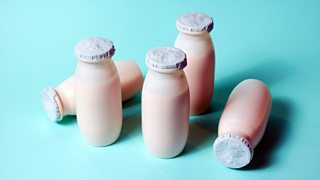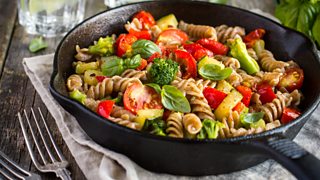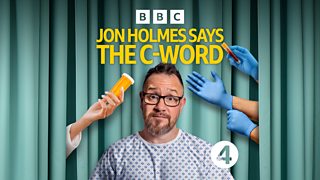Do cholesterol-lowering drinks and spreads actually work?
Cholesterol is often seen as the enemy when it comes to your risks of heart disease and stroke. But why is it considered to be so bad for us, and how effective are the products that claim to be able to lower it?
In this episode of 大象传媒 Radio 4's Sliced Bread, presenter Greg Foot is dipping into cholesterol-lowering foods, drinks and medications to figure out which products really work. Listener Cathy wants to know whether she's better trying to reduce her cholesterol levels through diet and lifestyle changes rather than reaching for the drinks and spreads, and if these products are worth the price tag. Greg is joined by two experts in the fields of heart disease and pharmacology to try to demystify the world of statins, sterols and stanols. Here's what you need to know about these cholesterol-lowering products…

Cholesterol comes in 'good' and 'bad' forms
First of all, there's a certain misconception that bears correcting: Cholesterol isn't inherently bad. Cholesterol is a type of lipid (fat molecule) that forms your many, many cell membranes. It's also used in the early stages of hormone and vitamin D production. Most of our cholesterol is made in the liver, but we obtain a smaller amount from our diet.
If you've ever heard about ‘good’ and ‘bad’ cholesterol, people are really talking about low-density lipoproteins (LDLs) and high-density lipoproteins (HDLs). HDLs are considered ‘good’ because they contribute to all of the aforementioned useful effects of cholesterol; the catch is, HDLs comprise just 20% of our total cholesterol. The other 80% are LDLs, which are crucial for transporting HDLs around the body but, when LDL levels are too high, they lodge in the walls of blood vessels and clog up our veins. These LDL deposits are what increase the risk of heart disease and stroke.
Avoiding saturated fats is the key to lowering cholesterol levels
According to the cholesterol charity Heart UK, foods that contain cholesterol – like eggs and shellfish - aren’t necessarily the problem because they don't make a big difference to the cholesterol in your blood. It's much more important to cut down on foods which contain saturated fats.
Jane Armitage, Professor of Clinical Trials and Epidemiology at The University of Oxford, agrees. She recommends avoiding saturated fats, as typically found in red meat, cheeses and butter. If you're wondering whether your food contains saturated fats, Jane's rule of thumb is that “if the fat goes solid… if it's something that is very fatty and congeals at room temperature” then you have saturated fat.
Additionally, a systematic review carried out in 2020 identified several foods as being particularly effective at lowering cholesterol. The most effective foods were found to be tomatoes, flax seeds and almonds, with moderate improvements seen from eating more avocados, hazelnuts, walnuts, green tea, pulses and turmeric.
Going further, a heart healthy diet consists of high fibre, low salt and polyunsaturated fats such as those found in oily fish. Peter Penson, Professor of Pharmacy Practice at Liverpool John Moores University, recommends the Heart UK website as a fantastic repository of LDL-lowering recipes. Aside from these low-saturated fat diets, a doctor may also prescribe some other medications in cases of more severe elevated LDL levels.
Statins are a safe method for reducing cholesterol with pharmaceuticals
Instead of altering how much cholesterol you ingest via your diet, statins are a prescription medication that directly act on your liver to decrease LDL production. There are comprehensive studies showing that over three to five years, statins massively reduce the risk of heart disease and lower cholesterol levels by 35-40%.
Although statins are totally safe when taken in conjunction with an adjusted diet, you may have heard people who are hesitant to take statins at all due to a particular side effect – increased muscle pain. However, new, more detailed studies have proven that statin-induced muscle pain is quite rare. Out of 15 people taking a course of statins and reporting muscle pain, just one of those will be due to the statins rather than outside factors. Jane explains that “we all get muscle pain, and when people have started statins in the past… they have sometimes [mistakenly] attributed it to the statin”. It is worth noting, however, that there is a very rare chance (between 0.1% and 0.01%) that a patient on statins will experience a serious muscle problem.
So, overall, statins are a relatively safe medication that should be used in addition to a heart-healthy diet. So why do so many people tend to opt out of taking them? Professor Peter Penson says that, apart from bad publicity in the past, the problem is mostly psychological. As mentioned earlier, statins don't have an immediate effect – it can take many years to decrease cholesterol levels, and even then, this positive effect isn't immediately noticeable because it is preventative. As such, patients often feel there is no perceived benefit, and will stop taking statins due to minor negative factors like imagined side effects, the inconvenience of picking up their prescription and so on.
The plant sterols and stanols found in store-bought drinks and spreads decrease how much cholesterol you absorb
With many sufferers of high cholesterol looking to maximise their LDL reduction or to find alternative solutions to their problem other than prescription medication, several cholesterol-lowering products have found their way onto supermarket shelves. Drinks, spreads and pills all claim to not just replace high cholesterol foods in one’s diet, but to actively reduce one's cholesterol levels.

Even younger people could benefit from being more aware of their cholesterol levels and acting early, either through diet or medication.
For the most part, these products contain high levels of plant sterols and stanols, two types of molecules that, for the purposes of human consumption, are virtually identical in their function. Like in animals, plants also have cell membranes. But plant cell membranes use plant sterols and stanols instead of cholesterol. When we eat plant sterols and stanols, we trick our gut into trying to absorb these molecules instead of cholesterol. Therefore, less cholesterol gets absorbed and instead passes through our system.
Evidence consistently shows a daily intake of 1.5-2.4 grams of plant sterols or stanols can help reduce cholesterol levels by 7-10% over 2-3 weeks. This amount is the same no matter whether you're looking at a store-brand product, or a more boutique alternative like Benecol's Yoghurt Drink. Hence, until there's evidence to say otherwise, you might want to opt for the cheaper alternative. Of course, Jane and Peter remind us that these plant sterols and stanols should still be taken in conjunction with other cholesterol-reducing tactics.
There are a couple of common-sense caveats to these suggestions. If you're eating a cholesterol-lowering spread, you’ll typically need to have three servings a day. Naturally, you'll want to make this an organic part of your diet rather than smearing spread on unhealthy foods that will mitigate the benefits of your cholesterol-lowering diet. Additionally, although many of these cholesterol-lowering products are ultra-processed foods, Peter assures us that “taking a spread and adding something that we know to be beneficial to it is a very rational thing to do”.
Heart disease and stroke risk should be addressed early and with multiple strategies
Heart disease and stroke are conditions that become more likely as you age. But as discussed, statins can take a long time to have an effect. When you're diagnosed as being at risk for one of these conditions, it can be a while before you're able to lower your LDL levels. As such, even younger people could benefit from being more aware of their cholesterol levels and acting early, either via diet or medication, to keep their LDLs under control. Peter compares LDLs to toxins: “The longer you're exposed to [LDLs], the more damage is done… the earlier stages of damage to blood vessels will happen in their late teens and 20’s”.
There are, of course, other ways to reduce your risk of heart disease and stroke. The big three factors impacting your risk are cholesterol levels, blood pressure and smoking. While exercise does virtually nothing to lower your cholesterol levels, it does help to decrease your blood pressure. Therefore, as expected, combining a low-cholesterol diet with exercise is a fantastic idea.
In summary, if you're looking to lower your cholesterol then trust your doctor's opinion – feel comfortable combining statins with low-cholesterol diets, even while consuming more cholesterol-lowering products containing plant sterols and stanols. Even try spreading some of them on your ‘sliced bread’!
To hear more about the ways you can reduce your risk of heart disease and stroke, listen to the full episode of Sliced Bread on 大象传媒 Sounds.
The information contained in this article was correct at the time of broadcast on 27 June, 2024.

More from 大象传媒 Radio 4
-
![]()
5 simple food tips for better health and wellbeing
How you can eat your way to better gut, immune system and heart health.
-
![]()
Inside Health
Series that demystifies health issues, separating fact from fiction and bringing clarity to conflicting health advice.
-
![]()
Jon Holmes Says the C-Word
Jon Holmes was diagnosed with cancer so - inevitably - here comes his new chatty podcast.
-
![]()
Can cooking with an air fryer save you money?
Sliced Bread is testing more wonder products suggested by you to see if their claims stand up to scrutiny.





